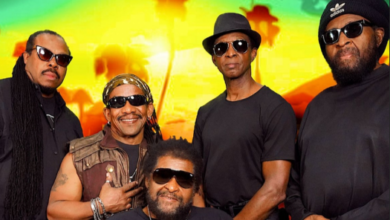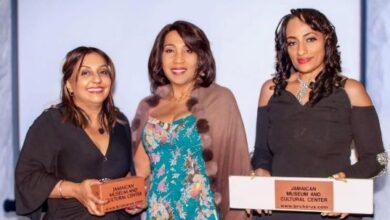Is Caribbean Culture At A Crossroads Or Is It A Crossroad Culture?
GREATER GEORGETOWN, Guyana – The Tenth Staging of the Caribbean Festival of the Arts, (CARIFESTA X) brought together, in a symposium, five outstanding literary artists who gave differing views on the status and future of Caribbean Culture under the theme: Caribbean Culture At the Crossroads: Seeking the Past, Living the Present, Exploring the Future.
The impressive panel of presenters comprising Trinidad and Tobago-born Guyanese author and poet Dr. Ian McDonald; Guyanese Linguistic Professor Dr David Dabydeen; Trinidad and Tobago’s Professor of West Indian Literature, Dr Kenneth Ramchand; Jamaica’s poet, orator, dramatist and professor, Dr Edward Baugh; and Suriname’s leading writer and researcher, Cynthia McLeod, who all paved the way for Nobel Laureate the Honourable Derek Walcott OCC of Saint Lucia to read from his volumes of poetry.
Opening the discussion, Dr McDonald opined that culture by its very definition, nature and the manner in which it evolved would always be at a crossroads. He pointed to our way of life as culture and argued that many of our systems including our political, economic, social systems were at a crossroads, but hastened to point out that we did have pockets of excellence which should form a cultural bedrock on which we could build.
He advocated the West Indian language as a cultural bedrock on which the Region could build and called for a nurturing of this core advantage, especially in our formal education system so that our young people, he said, could use the language better than anyone else in the world and also to ensure that the literature produced by the Caribbean was perpetuated successfully throughout the Region.
Ms McLeod acknowledged CARIFESTA as the cultural Mecca of the Region and argued that the Culture was not at a crossroads but was more a crossroad culture because of its diversity. She said History had ironically bequeathed us a legacy from which we had learnt creativity and innovativeness. She noted that steel bands started in the Caribbean because our ancestors had no money to buy other instruments, and slavery had taught us how to be resilient and united even while celebrating our differences. Those attributes, she suggested were enviable aspects of our culture that we needed to celebrate.
Ms McLeod also averred that our cultural diversity was the El Dorado – the gold of the Caribbean – which we could use to teach the world how to overcome differences.
Dr. Ramchand, author of the popular West Indian Novel and its Background, gave a poignant presentation which asserted that our Caribbean Culture took the wrong turn at the crossroads after we earned the right to vote in the 1950’s. He said, during that time, Caribbean governments made some questionable decisions which affected the development of culture and that the crisis now existing in our culture was a reflection of the crisis of the society as whole.
He contended that during the 1950’s the society was reinventing itself and that Caribbean governments had failed to seize and nurture that moment of “a self-inventing society,” as well as the architects of that invention – the artists.
No publishing houses; no repository of our Literatures and no recognition of our artists were some of the manifestations of what he called a ‘bad decision,’ made by Caribbean Governments, particularly those in his native Trinidad and Tobago.
Dr. Ramchand further defined Culture as a way of thinking, feeling, doing and seeing and asserted that our Culture was being challenged and under threat today: “The crisis in our society has had immeasurable effects on our whole way of life as well as on the forms of artistic and cultural expressions and the location of such expressions and on the impact and value specifically, and if you ask me how we have come to this crisis in our society … I would say …. that we have failed to recognize and disseminate (otherwise make known) and store the contribution of art and culture to the making, shaping and muscling of our society.”
Had we stored those contributions, Dr. Ramchand stated, we would not have been so fragile and vulnerable to global influences and pressures.
He then appealed to the Region to return to the crossroads to find another path towards cultural unity and diversity and find “charms to ward off the evil of our dark ages…”
Dr. Dabydeen shared the contents of earlier correspondence among young writers such as V S Naipaul and Henry Swansea to illustrate the difficulty they had in getting their works published and reiterated the call for a Caribbean publishing house and printing press which he said would ensure that Caribbean writers could be self-sustaining.
Professor Baugh who was tasked with introducing the feature reader of the evening, Mr Walcott, gave a critical analysis of Walcott’s Works, noting also that the heterogeneity of Caribbean culture was energizing our development and underscored that the culture was by no means at “a crossroads but was a crossroad culture.” He then introduced Mr. Walcott as one who was “always doing something new, pushing back frontiers – a threshold man and a crossroads man.”



